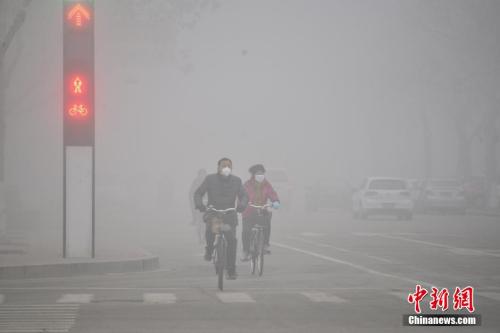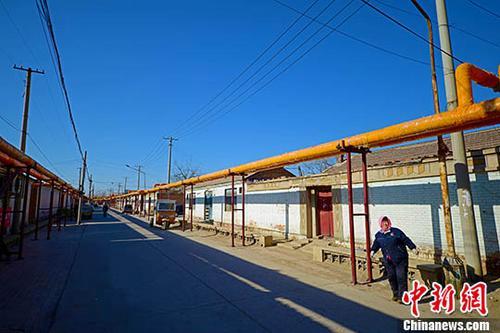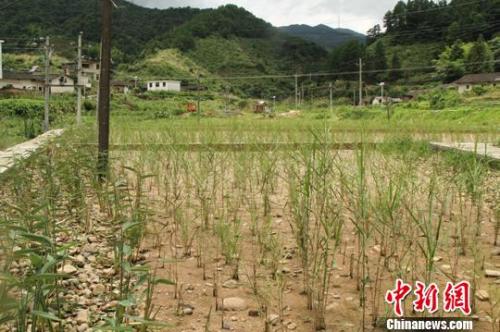Environmental tax will be levied next month! Do not withdraw from the historical stage by personal sewage charges.
BEIJING, Dec. 29 (Reporter Qiu Yuzhongqing) On January 1, 2018, China was the first one-way tax law to promote the construction of ecological civilization — — The Environmental Protection Tax Law will be formally implemented, which also means that the sewage charge system that has been implemented for nearly 40 years will withdraw from the historical stage.
Do ordinary residents have to pay environmental taxes? Are the collection standards the same everywhere? What changes will "fee to tax" bring to enterprises? Zhongxin. com has combed and interpreted this.

On February 12, 2016, many places in Shandong suffered from smog weather. Image source: vision china
Do individuals have to pay environmental taxes?
The Environmental Protection Tax Law stipulates that enterprises, institutions and other producers and operators that directly discharge taxable pollutants into the environment in People’s Republic of China (PRC) and other sea areas under the jurisdiction of People’s Republic of China (PRC) are taxpayers of environmental protection tax, and they shall pay environmental protection tax in accordance with the provisions of this law.
In other words, ordinary residents are not included in the scope of taxation and do not have to pay environmental taxes. According to local media reports, the responsible persons of tax authorities in Hebei, Jiangxi, Anhui and other places have made it clear that individual residents do not pay environmental protection tax.
When do you start paying taxes?
Zhongxin. com reporter learned from State Taxation Administration of The People’s Republic of China that the first collection period of environmental protection tax will be around April next year, not to say that tax returns will be started after January 1st.
In this regard, Shi Zhengwen, director of the Finance and Tax Research Center of China University of Political Science and Law, pointed out in an interview that the environmental protection tax is "calculated on a monthly basis and declared quarterly", and the reporting period and the time when the specific tax obligation occurs are two different things.
Shi Zhengwen said that the tax calculation began on January 1, but the declaration was from April 1 to 15. During this half-month period, enterprises had to declare their taxes.

Data Map: In Guozhuangzi Village, Xinkou Town, Xiqing District, Tianjin, electric heating pipes instead of coal are connected to every household. China News Service reporter Yan Yushe
What pollutants are taxed?
The Environmental Protection Tax Law clearly states that air pollutants, water pollutants, solid waste and noise are listed as taxable pollutants.
Taxable air pollutants include sulfur dioxide, nitrogen oxides, carbon monoxide, chlorine gas, etc. Taxable water pollutants include total mercury, total cadmium, total lead, petroleum, animal and vegetable oils, formaldehyde, etc.
It is worth noting that noise refers to industrial noise according to the Table of Items and Taxes of Environmental Protection Tax attached to the Environmental Protection Tax Law. This means that construction noise and traffic noise are not included in the scope of collection.
According to the Law on the Prevention and Control of Environmental Noise Pollution, environmental noise refers to the sound produced in industrial production, construction, transportation and social life that interferes with the surrounding living environment.
Among them, industrial noise refers to the sound that interferes with the surrounding living environment when using fixed equipment in industrial production activities; Construction noise refers to the sound that interferes with the surrounding living environment during construction.
How much do you pay?
According to the Environmental Protection Tax Law, the amount of environmental protection tax has both an upper limit and a lower limit. The tax range of air pollutants is from 1.2 yuan to 12 yuan per pollution equivalent, and that of water pollutants is from 1.4 yuan to 14 yuan per pollution equivalent.
Pollution equivalent refers to a comprehensive index or unit of measurement to measure the environmental pollution caused by different pollutants according to the harmful degree of pollutants or pollution discharge activities to the environment and the technical economy of treatment.
For example, in terms of industrial noise, different decibels exceed the standard, and the monthly tax levied is different. For example, if it exceeds the standard by 1-3 decibels, 350 yuan will exceed the standard by more than 16 decibels per month, and it will cost 11,200 yuan per month.

Data Map: Wetland Ecological Restoration Project in Sanbiao Township, Xunwu County, Jiangxi Province. Su Lucheng photo
Is the tax payment standard the same everywhere?
According to the Environmental Protection Tax Law, each province has certain discretion in the specific applicable tax amount of air pollutants and water pollutants. In other words, the specific tax payment standards may be different from place to place.
"This is equivalent to giving local governments greater discretion," Shi Zhengwen said. "The Environmental Protection Tax Law mentions three factors, namely, the environmental carrying capacity of the local area, the current situation of pollutant discharge and the requirements of economic, social and ecological development goals. According to these three factors, local governments determine the specific applicable tax amount, which varies greatly among different provinces."
Among them, Beijing-Tianjin-Hebei and surrounding provinces generally set higher taxes on air pollutants and water pollutants. The applicable tax amount of taxable air pollutants in Beijing is 12 yuan per pollution equivalent, and the applicable tax amount of taxable water pollutants is 14 yuan per pollution equivalent, both of which are implemented according to the upper limit of tax range stipulated in the Environmental Protection Tax Law.
Will it increase the burden on enterprises?
The relevant person in charge of State Taxation Administration of The People’s Republic of China told the reporter of Zhongxin.com that the environmental protection tax was jointly promoted by the Ministry of Environmental Protection, the Ministry of Finance and the State Administration of Taxation. According to the standard of "shifting taxes and fees", the past sewage charges were directly converted into environmental protection taxes. Of course, generally speaking, the design of policies is not aimed at collecting money, but mainly to stimulate the awareness of environmental protection and boost the consciousness of environmental protection.
The person in charge of the Regulation Department of the Ministry of Environmental Protection said that changing the sewage charges into environmental taxes is conducive to improving the rigidity of law enforcement, reducing local government intervention and internalizing environmental costs. Environmental protection tax is levied according to the amount of emissions, with more emissions and more payments, less emissions and less payments, which is conducive to promoting enterprises to improve their environmental protection level and reduce pollutant emissions.

Data Map: Seven enterprises and institutions withdrew from Fuxian Lake Nature Reserve in Yunnan, showing their determination to protect the environment. China News Service reporter Ren Dongshe
Does the environmental protection tax belong to the local government or the central government?
On December 27th, the State Council issued the Notice on the Ownership of Environmental Protection Tax Revenue, which made it clear that environmental protection tax was local revenue.
The circular pointed out that in order to promote the protection and improvement of the environment and increase investment in environmental protection, the State Council decided to use all environmental protection taxes as local income.
The current sewage charges are divided between the central and local governments by 1: 9. Wang Jianfan, director of the Department of Taxation and Administration of the Ministry of Finance, pointed out earlier that in order to mobilize local enthusiasm, considering that local governments bear the main responsibility for pollution control, it is planned to take all environmental taxes as local income, and the central government will no longer participate in the sharing. (End)